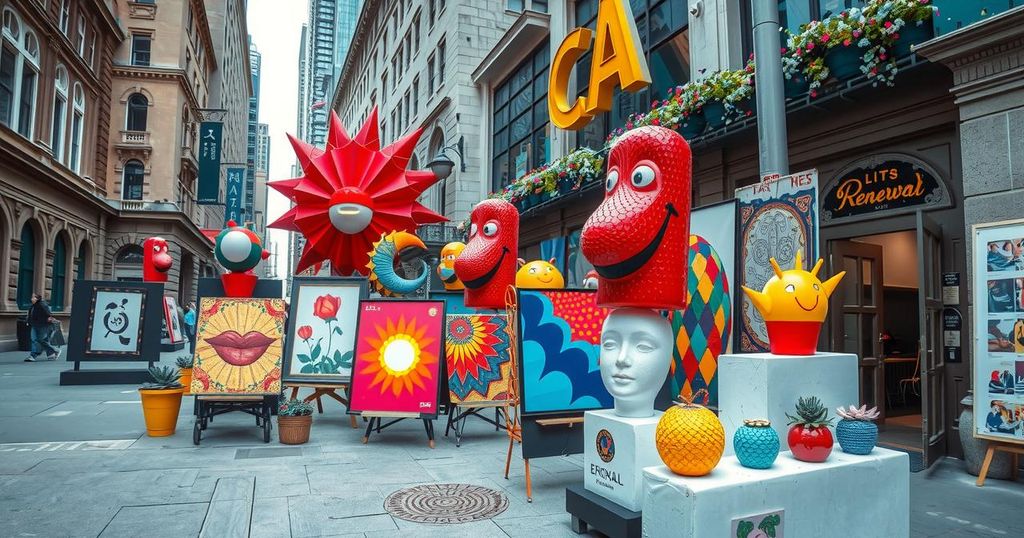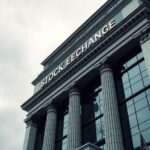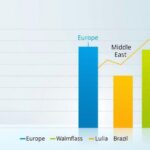Hong Kong’s Art Market Faces Economic Uncertainty Amid Institutional Growth
Hong Kong’s economy shows recovery yet remains cautious, marked by low GDP growth and consumer confidence issues linked to China’s recession. Art Basel Hong Kong faces uncertainty, but local support persists amidst a changing art ecosystem. Institutional growth and new collectors from Southeast Asia are injecting vibrancy, while selectivity is noticeable among buyers, focusing on blue-chip works amid economic volatility.
Despite a rebound in Hong Kong’s economy following the lifting of Covid-era travel restrictions, the city still faces challenges. In 2022, it recorded a modest GDP growth of 2.6 percent, which is projected to remain similar this year. However, the correlation between this economic stability and the performance of the art market at Art Basel Hong Kong remains uncertain.
Throughout last year, discussions surrounding Hong Kong Art Week suggested that China may be experiencing a recession, exacerbated by a crisis in the property market and waning consumer confidence. According to Nomura, consumer sentiment in China has nearly reached a historic low, leading top auction houses in Hong Kong to report decreased sales, while galleries noted dwindling demand for artworks as the market’s dynamics seem to shift.
China has initiated measures to stimulate its economy, including an economic plan designed to bolster consumption and stabilize the stock market. These actions come amid analyses revealing that the country is facing a period of deflation, with falling housing prices and rising unemployment at 5.1 percent. In contrast, Hong Kong’s unemployment rate remains more favorable at 3 percent, although fluctuations in the external economy continue to affect investor sentiment.
The decline in Hong Kong’s real estate market, which has dropped 27 percent over three years, may influence the art sector as many local and mainland Chinese investors are heavily vested in property. As Art Basel Hong Kong approaches, economic apprehension looms, though high-profile sales may mitigate some concerns.
Art adviser Alexandre Errera indicated that confidence plays a crucial role in the art market’s resilience amidst crises. He remarked, “Right now, it is very shaky, but I really think that the art market has proven that when there is a crisis, it is capable of being very resilient.”
David Zwirner’s Patricia Crockett pointed out that while the city is not immune to global economic downturns, local collectors have shown increased support for Hong Kong’s art scene over the past year. Notably, institutional growth has positioned Hong Kong as a key player in the art world, showcasing ambitious exhibitions and collaborations, such as the agreement between M+ and New York’s Museum of Modern Art.
In recent years, Hong Kong’s art landscape has flourished with numerous galleries and institutions, with major auction houses enhancing their presence in the city. The emergence of Southeast Asian collectors has also contributed to the buoyancy of the market. Notably, Derman from White Cube recognized a rising interest from collectors in the region with ongoing museum development.
However, there is evidence that collectors are increasingly selective, focusing on high-value investments with proven resale potential. Errera noted a shift away from speculative purchases toward blue-chip artworks, particularly highlighting the hesitation surrounding ultra-contemporary pieces by emerging Western artists.
Christie’s Asia Pacific president, Francis Belin, confirmed the ongoing engagement of Asian collectors in the auction market, revealing that they accounted for 30 percent of total spending at Christie’s global auctions in recent times. The opening of Christie’s new headquarters in Hong Kong will enable broader exhibition opportunities and enhance community ties.
Art Basel Hong Kong continues to play a significant role in the regional art scene, occurring amid a vibrant year-round calendar filled with auctions, biennales, and art fairs across Asia. Despite the overarching economic concerns, many stakeholders remain optimistic about the future of Hong Kong’s art ecosystem.
In summary, while Hong Kong’s economy shows signs of recovery, challenges remain, particularly concerning the art market amid uncertainties stemming from China’s economic situation. Despite lower sales reports and cautious collector behavior, there is a noted resilience in the local art scene, bolstered by ongoing institutional growth and emerging regional collectors. The unfolding events at Art Basel Hong Kong will be a crucial indicator of the market’s trajectory in the face of broader economic fluctuations, with optimism sustained by continual engagement in arts and culture within the region.
Original Source: www.artnews.com








Post Comment